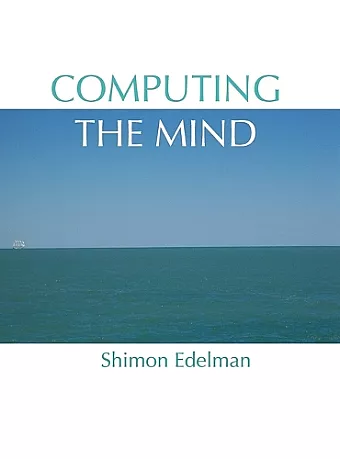Computing the Mind
How the Mind Really Works
Format:Hardback
Publisher:Oxford University Press Inc
Published:25th Dec '08
Currently unavailable, and unfortunately no date known when it will be back

In a culmination of humanity's millennia-long quest for self knowledge, the sciences of the mind are now in a position to offer concrete, empirically validated answers to the most fundamental questions about human nature. What does it mean to be a mind? How is the mind related to the brain? How are minds shaped by their embodiment and environment? What are the principles behind cognitive functions such as perception, memory, language, thought, and consciousness? By analyzing the tasks facing any sentient being that is subject to stimulation and a pressure to act, Shimon Edelman identifies computation as the common denominator in the emerging answers to all these questions. Any system composed of elements that exchange signals with each other and occasionally with the rest of the world can be said to be engaged in computation. A brain composed of neurons is one example of a system that computes, and the computations that the neurons collectively carry out constitute the brain's mind. Edelman presents a computational account of the entire spectrum of cognitive phenomena that constitutes the mind. He begins with sentience, and uses examples from visual perception to demonstrate that it must, at its very core, be a type of computation. Throughout his account, Edelman acknowledges the human mind's biological origins. Along the way, he also demystifies traits such as creativity, language, and individual and collective consciousness, and hints at how naturally evolved minds can transcend some of their limitations by moving to computational substrates other than brains. The account that Edelman gives in this book is accessible, yet unified and rigorous, and the big picture he presents is supported by evidence ranging from neurobiology to computer science. The book should be read by anyone seeking a comprehensive and current introduction to cognitive psychology.
This is a surprising book. On page 1, I was told that it contains a map of the London Underground; on page 275, I discovered why, and the pages accidentally viewed between had me trapped. Almost every one has an illustration, and the text tells its tale in lucid, well-focused paragraphs. You would learn a lot just from flipping its pages, and I can guarantee that you would also be entertained. If you have the slightest interest in the mind and how it works, you should not let this book slip past you. * Horace Barlow, FRS, Retired Royal Society Research Professor of Physiology, University of Cambridge *
Edelman develops the thesis that the mind is computation, grounds it in neuroscience, supports it with empirical findings from diverse literatures, and brings it to bear on classical philosophical issues. Exemplifying the future of the science, the treatment is so inter-disciplinary as to not show favoritism towards a particular discipline. The writing is playful enough for a lay audience, accessible enough for advanced undergraduates, and informative enough for seasoned scientists. * Lawrence W. Barsalou, Samuel Candler Dobbs Professor of Psychology, Emory University *
A well-written and provocative attempt to integrate the detailed findings of psychology and neuroscience within a computational paradigm where computation boils down not to computers but to organization. * Margaret A. Boden, Research Professor of Cognitive Science, University of Sussex *
This is an awe-inspiring book in multiple senses, but most importantly because it inspires its reader to be awed by the mysteries of the mind, and even more awed by what is known. Dr. Edelman forges a unified and coherent theory that nonetheless encompasses topics as diverse as computation, consciousness, perception, attention, memory, judgment, reasoning, creativity, language, ethics, truth, and beauty. The book offers a rigorous, computational account of cognition that is simultaneously witty, cultivated, and connected to the world. * Robert Goldstone, Chancellors Professor of Psychological and Brain Sciences, and Director of the Cognitive Science Program, Indiana University *
Shimon Edelman has written a fresh book about one of the main mysteries in science today: how the mind works and, in fact, what is the mind? It is easy and fun to read but at the same time almost every page reveals a new intriguing connection between computation, psychology and philosophy. I find it to be deep, challenging, and provocative ... wonderful for any curious mind. * Tomaso Poggio, Eugene McDermott Professor, McGovern Institute, Computer Science and Artificial Intelligence Lab, and Brain Sciences Department, Massachusetts Institute of Technology *
As I have long held, philosophers and scientists studying the mind should be required to have first-hand experience of designing, implementing, testing, debugging, documenting, and analyzing working cognitive systems. Simply reading about it is no substitute, though I think reading this book comes pretty close, and, in any case, should accompany doing it. * Aaron Sloman, Honorary Professor of Artificial Intelligence and Cognitive Science, University of Birmingham *
ISBN: 9780195320671
Dimensions: 203mm x 231mm x 38mm
Weight: 1338g
640 pages